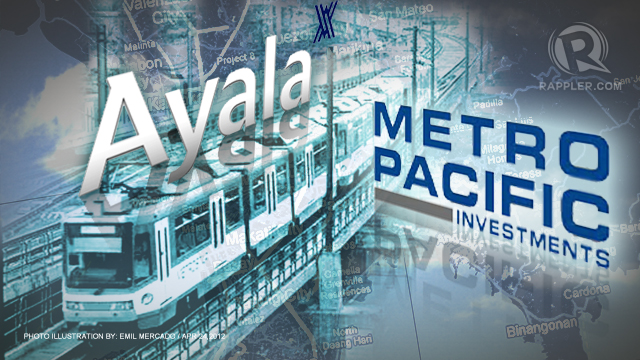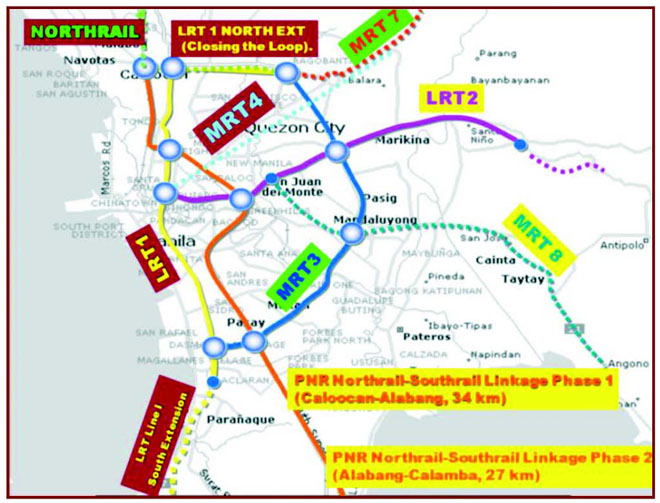SUMMARY
This is AI generated summarization, which may have errors. For context, always refer to the full article.

MANILA, Philippines [UPDATED] – Two are better than one.
On Tuesday, April 24, telecommunications rivals Ayala and Pangilinan-led business groups forged an exclusive partnership for rail projects the government plans to auction off.
In a strategic move, two of the country’s biggest conglomerates — which control the largest local telecommunication firms — entered into a memorandum of agreement to pursue and develop light rail system projects in Metro Manila.
Ayala Corp. chair Jaime Augusto Zobel de Ayala and Metro Pacific Investment Corp. (MPIC) chair Manuel V. Pangilinan signed a memorandum of agreement in Shangri-la Hotel in Makati City as other private investors vie for infrastructure projects up for bidding soon.
The two groups are behind fierce competitors Globe Telecom and Philippine Long Distance Telephone Co (PLDT), but are now partners for LRT-1, LRT-2, and MRT-3, the rail projects included in the government’s public-private partnership scheme.
Under this rival-turned-partners’ exclusive and strategic partnership agreement, Ayala Corp and MPIC will each own 50% interest in these key transportation and infrastructure projects, as well as the real estate development undertakings that will benefit from them.
With a combined market capitalization of P300 billion, as well as experience in water, utilities, and toll roads businesses, the key executives at the Ayala and Pangilinan-led business groups expressed confidence they have the expertise and deep pockets for these big ticket projects.
“We are glad to be partnering with the Metro Pacific Investments group for this specific purpose. We each have unique strengths and capabilities that, when combined, create a unique value proposition in rail development…Developing an efficient mass transit system is a huge endeavor which will be better served by the synergies created by this partnership,” Ayala said in a statement.
“We are pleased to share a common ground with Ayala Corporation through the Light Rail Projects. This strategic alliance will create integrated solutions that will improve public transportation through our vision to transform the country’s light rail transit system into a network very much like those in Hong Kong, Singapore, Kuala Lumpur and Osaka,” Pangilinan shared.
“The existing system is over capacity and under invested – the need to improve the existing rail systems now cannot be overemphasized,” Pangilinan added.
Light rail projects
The Aquino government has lined up the following light rail projects under its PPP scheme, which is crucial in its infrastructure and economic growth strategies.
- Operations and Maintenance (O&M) of the LRT 1 South Extension project
- O&M of Line 2 Extension project, worth about P11.3 billion. This involves the construction of a 4-kilometer eastern extension of LRT Line 2 from Santolan in Pasig City to Antipolo, Rizal
- Common ticketing system for MRT and LRT. This involves the integration of fare collection system of the MRT-3 and LRTA railway lines, as well as the replacement of the magnetic-based ticketing system with a contactless-based smart card technology on LRT Lines 1, 2 and MRT-3
- O&M of LRT-1 project worth around P7.7 billion. This project involves a 3 to 4-year interim contract, which could then evolve into a full contract to include the integration of the LRT-1 and MRT-3 systems
- O&M of MRT-3 project worth about P6.3 billion. This also involves an interim contract until MRT-3 integrates with LRT-1

Rivals and partners
Ayala and MPIC are business rivals not just in telecommunication, but also in various infrastructure and water utility projects lined up by the government.
Each joined the first round of the bidding process for the MRT-3 O&M project when it was first pursued by former Transportation Secretary Ping de Jesus. (Current Transportation Secretary Mar Roxas decided to review the project and bid it out later)
MPIC already has a stake in MRT Corp, which has an economic interest in the rail project, giving them a foot in the door of a key infrastructure project in the capital city.
Ayala, on the other hand, was part of the consortium that used to control MRT-3 through a complex ownership structure that involved MRT Corp.
The PPP contract between the government and the consortium then had a guaranteed 15% financial return favoring the private players, but eventually turned out to be a burden to the government. Ayala eventually sold out its MRT Corp stake.
Last week, Jaime Zobel de Ayala told reporters that have renewed interest to participate again in the MRT-3 project, as well as in LRT-1, as the conglomerate shifts business strategy.
On top of their current core businesses – real estate, banking, telecommunications, and electronics — the Ayala chief told stockholders during their annual meeting last week that the new focus would be infrastructure and power projects.
He said this complements their decision to also target the mass market across their businesses, which have typically aimed at the higher-end markets for growth and sustainability.
Nonetheless, the two highlighted that this newly announced partnership is not their first. They combined forces in 2010 to bid for the Angat water project. They lost to another bidder.
The Angat dam supplies water to their individual water utility services: Maynilad for MPIC and Manila Water for Ayala. – Rappler.com; Research by Katherine Visconti
Add a comment
How does this make you feel?
There are no comments yet. Add your comment to start the conversation.